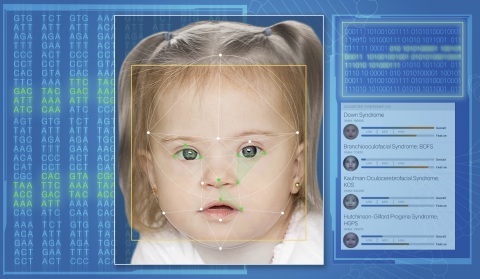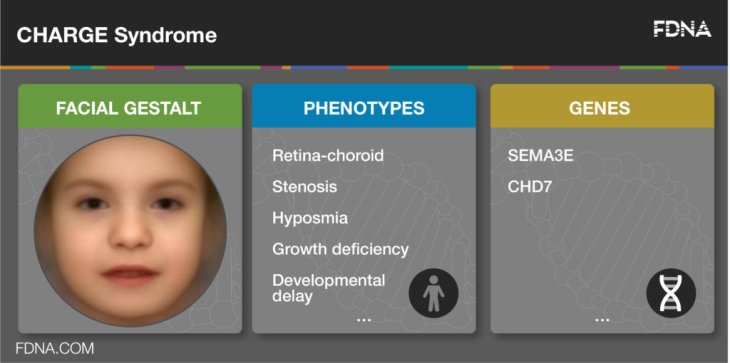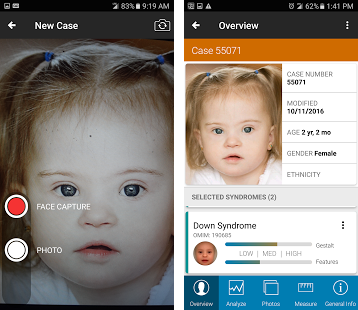AI Determines Genetic Disorders By Looking At Faces
Indira Datta - Jan 09, 2019

Face2Gene, which works on artificial intelligence technology, is able to diagnose rare genetic disorders faster and more accurately.
- Google's Project Genie: Premium Subscribers Unlock Interactive AI-Generated Realms
- New ‘Deep Nostalgia’ AI Allow Users To Bring Old Photos To Life
- Pilots Passed Out Mid-Flight, AI Software Got The Aircraft Back Up Automatically
The rare genetic disorder is really true to its name, very rare. That's why it's difficult for clinicians to diagnose it. When an accurate diagnosis is not available, patients may not be offered the best and most appropriate treatments. A new application called Face2Gene, which works on artificial intelligence technology, is able to change that.

The application can identify various types of disorders based on the data it was previously provided
The app's developers say it is able to diagnose children's rare genetic disorders by analyzing their faces and it can do better than doctors. If it can be widely used globally, it can help many children around the world to be treated properly, under the condition of overcoming some hurdles.
FDNA that specializes in digital human health support is the company that developed this Face2Gene application. On Monday, Nature Medicine published an article describing the Boston-based company research work.
Accordingly, FDNA provided Face2Gene's deep learning algorithm with 17,000 images of patients with 216 genetic syndromes. Based on these data, AI will analyze and diagnose the disease by searching for facial features. For different special features recorded by the system, they will categorize and detect different specific types that patients suffer.
During the experiment, the researchers put 502 images that had not been recorded in Face2Gene's algorithm before in order to make them diagnose, and the result was that it gave 62% correct diagnosis. After being adjusted so that Face2Gene was allowed to give 10 diagnoses that patients can get, this application shows an accuracy of up to 91%.
Moreover, researchers also compared Face2Gene the ability to diagnose genetic disorders with 49 clinical geneticists in a workshop on birth defects. In that informal competition, the team gave 10 photos of children with genetic disorders but there are signs that are easily recognizable and require geneticists to diagnose the types of the different disorders of each patient.
There were 49 participants but only 2 of them correctly diagnosed 50% of the photos. And the application on the phone - Face2Gene correctly diagnosed 7 out of 10 photos.

Trials to diagnose rare gene disorders are done on pictures of children faces
The FDNA company needs to provide this algorithm with lots of data so that it can serve as a platform to increase its diagnostic accuracy. The current data that researchers are targeting are non-white skin face images. An example in 2017 shows that Face2Gene identified people with Down Syndrome with 80% accuracy for a white Belgian but that number is only 37% for black Congolese.
Not only patients and doctors, many professional researchers and experts were also impressed and satisfied with the speed and accuracy of Face2 Gene's diagnoses. Typically, Christoffer Nellåker from Oxford University, although not involved in the research and development process of this application, he showed surprise and praised this application.
According to Nellåker, the current limitation in research and treatment of this disease is a diagnosis that may take several years. This type of technology can save people diagnostic time by reducing search time and the remaining work of experts is reviewing and verifying the accuracy of the results.
Nellåker also said, Face2Gene shortened the time to search and diagnose patients' diseases significantly and instead, we will have more time to research and develop appropriate treatment routes as well as invent new treatments for this disease.
The company is developing this application with the aim of providing fast, accurate and completely free diagnostic tools for professionals and doctors.
Featured Stories

Features - Jan 29, 2026
Permanently Deleting Your Instagram Account: A Complete Step-by-Step Tutorial

Features - Jul 01, 2025
What Are The Fastest Passenger Vehicles Ever Created?

Features - Jun 25, 2025
Japan Hydrogen Breakthrough: Scientists Crack the Clean Energy Code with...

ICT News - Jun 25, 2025
AI Intimidation Tactics: CEOs Turn Flawed Technology Into Employee Fear Machine

Review - Jun 25, 2025
Windows 11 Problems: Is Microsoft's "Best" OS Actually Getting Worse?

Features - Jun 22, 2025
Telegram Founder Pavel Durov Plans to Split $14 Billion Fortune Among 106 Children

ICT News - Jun 22, 2025
Neuralink Telepathy Chip Enables Quadriplegic Rob Greiner to Control Games with...

Features - Jun 21, 2025
This Over $100 Bottle Has Nothing But Fresh Air Inside

Features - Jun 18, 2025
Best Mobile VPN Apps for Gaming 2025: Complete Guide

Features - Jun 18, 2025
A Math Formula Tells Us How Long Everything Will Live
Read more

ICT News- Feb 19, 2026
Escalating Costs for NVIDIA RTX 50 Series GPUs: RTX 5090 Tops $5,000, RTX 5060 Ti Closes in on RTX 5070 Pricing
As the RTX 50 series continues to push boundaries in gaming and AI, these price trends raise questions about accessibility for average gamers.

ICT News- Feb 18, 2026
Google's Project Toscana: Elevating Pixel Face Unlock to Rival Apple's Face ID
As the smartphone landscape evolves, Google's push toward superior face unlock technology underscores its ambition to close the gap with Apple in user security and convenience.

Mobile- Feb 17, 2026
Anticipating the Samsung Galaxy S26 and S26+: Key Rumors and Specs
The Samsung Galaxy S26 series is on the horizon, sparking excitement among tech enthusiasts.
Comments
Sort by Newest | Popular